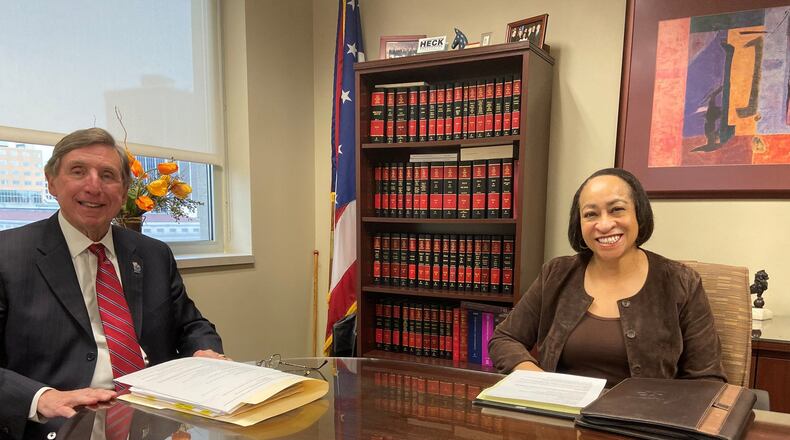Its staff remain in contact with victims, witnesses and families for as long as they need support, said Sandy Hunt, the division’s director. They are still working with some witnesses involved in cases that have been resolved for more than two decades.
On Aug. 4, they arrived in the Oregon District to start that process, providing immediate grief counseling and helping locating people. On-the-spot grief counseling is an important first step for relatives and survivors of traumatic events such as mass shootings, said Dr. Carol North, a Texas-based crisis expert who has studied more than 3,500 survivors of major disasters.
RELATED: Remembering the Victims
Hunt and her team spent about 18 hours in the Oregon District working with victims and their families on the day of the shooting.
The team consists of eight full-time staff members and several volunteers. They’re accustomed to being called to various types of crimes, including homicides, domestic violence and sexual assaults, 24 hours a day.
They are trained in mass casualties and crisis response, Hunt said. But they had never responded to a crisis on the scale of the Oregon District massacre in which nine people were killed and 27 injured.
“It was definitely the largest scale incident (the team has responded to),” Hunt said. “We get calls from police departments to come to crime scenes, you know, immediately after crimes happen to deal with families or children who may witness the incident. But yes, this was definitely exceptional.”
City seeks more generators for water system after tornado, outage
The program helps victims by informing them of their rights, keeping them updated about the case they’re involved in, providing mental health counseling and other services. In some cases, they’ve provided clothing or transportation for survivors and victims who have to testify in court.
The program’s victims advocates can be reached 24 hours a day, seven days a week, Montgomery County Prosecutor Mat Heck Jr. said.
“So we’re going to make sure to help them, and give them the support they need, not only in court, but out of court also,” he said, noting that the program acts as a conduit between the victim and the criminal justice system.
‘Like an angel’
In the days after the Oregon District shooting, each person who was injured by gunshot and each family that lost a loved one was assigned an advocate from the Victim-Witness Division.
More than four months after the shooting, the advocates continue to work with the families in various ways. They’ve kept them updated on the case as it’s gone through the legal system. But most importantly, Hunt said, the team’s helping the families and surviving victims work through the trauma.
AMELIA ROBINSON: Faith and forgiveness in a year overflowing with grief
Dion Green, whose father Derrick Fudge died in his arms after being shot in the Oregon District, said his advocate has been like an angel to his family.
Green and his girlfriend Donita Corsey were diagnosed with PTSD after the shooting. Although they have counselors they see regularly, the Montgomery County Victim-Witness Division’s advocate is always available to talk when they are feeling depressed and their counselor is not available.
They’ve formed a bond, he said.
“I told her she’s family now,” Green said of his advocate. “My daughter and her daughter are friends. She checks on us all the time, and she goes above and beyond to make sure my family and I have what we we need.”
Within the first few weeks of working with the families, Hunt and her team noticed that victims were in various stages of trauma, but most were in shock. They had trouble eating, sleeping and quite a few had difficulties returning to work, either because of their physical injuries or emotional trauma, Hunt said.
The victims vary in how they’ve responded to treatment, with some need more time to heal than others. The Victim-Witness Division’s advocates will work with them for as long as possible, Hunt said.
“You know, you go through that shock stage and then that disbelief, you think it can’t be real,” she said. “So part of our job is to help them regain some of that sense of normalcy so they can start healing and get their lives back. It’ll never be the same, though.”
A privilege to serve
Within the first week after the shooting, the Victim-Witness Division members worked long hours with victims, and it took a toll on them. Team members experience compassion fatigue — when someone is exposed to violence repeatedly and starts to experience physical, emotional or psychological exhaustion, Hunt said.
So the prosecutor’s office held a debrief and offered counseling for the staff, Heck said.
“That’s very important,” he said.
The team has also provided similar services for other law enforcement agencies in the county that responded to the shooting, Hunt said.
The team’s been trying to return to normalcy itself. Although they’ve been overwhelmed with the Oregon District shooting, they are working to ensure homicides and the myriad of other cases don’t get lost, Hunt said, noting that other area agencies assist her team.
“As taxing as it was on my staff, we feel that it was a privilege to be able to serve the victims,” she said.
About the Author
